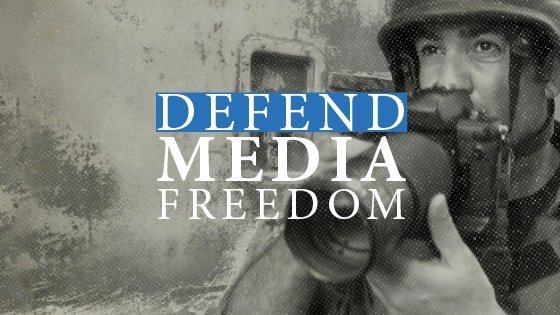New pledges not credible without action, say press freedom groups
Global Conference for Media Freedom: London 2019
On 9 July, 33 press freedom and media development organisations met in London in advance of the Global Media Freedom Conference to call on all participating States to ensure the protection and safety of all journalists and media workers in compliance with their existing obligations and international standards.
The group, representing and working with hundreds of thousands of journalists and media workers, said new pledges will only be credible if States immediately:
Release all imprisoned journalists;
Stop killing, attacking and denigrating journalists;
Investigate and prosecute all murders of journalists.
The group demands all States hold themselves and their counterparts accountable and show demonstrable progress. Several States attending the Conference currently have journalists in prison and unsolved murders.
The group put forth 11 recommended commitments for States attending the Global Media Freedom Conference, hosted by the governments of the United Kingdom and Canada (see below).
Recommended commitments for States attending the Global Media Freedom Conference
Press freedom and media development organisations listed below call on States to:
Publicly condemn acts of violence against journalists and media freedom violations whenever they occur online or offline and ensure impartial, thorough, independent, effective and transparent investigations into all such incidents;
Immediately and unconditionally release all journalists imprisoned for their work. Set up national multi-stakeholder expert panels to review all legislation that can be used to harass, imprison, or otherwise target journalists, and bring legislation in line with international freedom of expression standards, including by providing effective safeguards against abuse;
Investigate all murders of journalists and media workers. Ensure that investigations are sufficiently and effectively resourced, timely, and re-opened if necessary. The aim should be to substantially increase the percentage of prosecution of all those responsible for the murders of journalists and media workers;
Refrain from targeting and denigrating the media, online or offline;
Adopt and fund the proposal made by the U.N. Special Rapporteur on Extrajudicial Killings to reinforce the capacity of the U.N. to investigate violence against journalists by establishing a standing instrument for the investigation of violent crimes against journalists and media workers targeted for their work;
Ensure that all media workers, including newsgatherers, freelance reporters, citizen journalists, fixers, field producers, translators, and drivers, are included in any initiatives for the protection of journalists;
Provide visas to journalists at risk to enable them to participate in safety training, and provide asylum when appropriate;
Ban the export, sale, transfer, use, or servicing of privately developed surveillance tools, often used to target journalists, and facilitate the export and import of personal protective equipment (PPE) without military authorization;
Expedite the implementation of effective access to information laws and practices, as agreed in target 16.10 of the Sustainable Development Goals, including by providing adequate funding and technological support and resourcing independent oversight;
Commit to transparently expediting implementation of the U.N. Plan of Action on the Safety of Journalists and the Issue of Impunity, including through the establishment of effective national safety mechanisms and a stronger, more robust, accountable, and accessible political coordination of focal points in relevant U.N. agencies and programs;
Support and sustain the work of the media community, civil society, and academia in the promotion and protection of media freedom, the safety of journalists, the financial and economic sustainability of media, an enabling and pluralistic media environment, and access to information, especially in time of digital disruptions.
A Culture Of Safety (ACOS)
Alliance for Journalists’ Freedom
ARTICLE 19
Association of European Journalists Centre for Freedom of the Media CFI, French Media Development Agency Committee to Protect Journalists (CPJ) Commonwealth Human Rights Initiative Commonwealth Journalists Association DW Akademie English PEN European Centre for Press and Media Freedom (ECPMF)
Freedom House
Free Press Unlimited (FPU)
Frontline Club
Frontline Freelance Resigter (FFR)
Fundación para la Libertad de Prensa (FLIP)
Global Forum for Media Development (GFMD)
Global Voices
Gulf Centre for Human Rights (GCHR)
International Center for Not-for-Profit Law (ICNL)
International Federation of Journalists (IFJ)
International Media Support (IMS)
International Press Institute (IPI)
International Women’s Media Foundation (IWMF)
Internews
Media Diversity Institute
Media Legal Defence Initiative (MLDI)
Palestinian Center for Development and Media Freedoms (MADA)
PEN America
PEN International
Reporters Without Borders
Rory Peck Trust
Samir Kassir Foundation - SKeyes Center for Media and Cultural Freedom
South Asia Media Defenders Network
World Association of News Publishers (WAN-IFRA)
Alliance for Journalists’ Freedom - Peter Greste. [email protected] +44 7467 478469
ARTICLE 19 - Thomas Hughes [email protected] +44 7850 573561
Association of European Journalists
Centre for Freedom of the Media
CFI, French Media Development Agency
Committee to Protect Journalists (CPJ) - Courtney Radsch [email protected] +1-212-300-9032
Commonwealth Human Rights Initiative
Commonwealth Journalists Association
DW Akademie
English PEN
European Centre for Press and Media Freedom (ECPMF) - Lutz Kinkel, [email protected]
Freedom House
Free Press Unlimited (FPU) - Leon Willems, [email protected], +31613111694
Fundación para la Libertad de Prensa (FLIP)
Global Forum for Media Development (GFMD)
Global Voices - Ivan Sigal [email protected]
Gulf Centre for Human Rights (GCHR)
International Center for Not-for-Profit Law (ICNL)
International Federation of Journalists (IFJ) - Jeremy Dear [email protected] +32 479077194
International Media Support (IMS)
International Press Institute (IPI) - Barbara Trionfi [email protected] +43 699 10257062
International Women’s Media Foundation (IWMF) - Nadine Hoffman [email protected]
Internews - Daniel Bruce [email protected] / [email protected]
Media Diversity Institute - Milica Pesic [email protected], +44 7990971564
Media Legal Defence Initiative (MLDI)
Palestinian Center for Development and Media Freedoms (MADA) - Mousa Rimawi [email protected]
PEN America
PEN International
Reporters Without Borders - Thomas Friang [email protected]
Rory Peck Trust
Samir Kassir Foundation - SKeyes Center for Media and Cultural Freedom
South Asia Media Defenders Network
World Association of News Publishers (WAN-IFRA) - Andrew Heslop [email protected]

